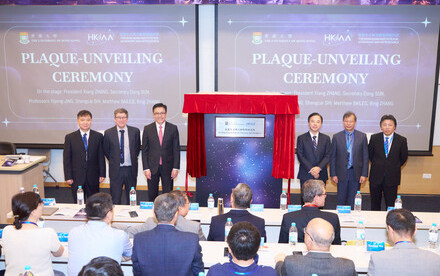30 Oct 2019
Young scientists from the Faculty of Science awarded China's Excellent Young Scientists Fund 2019

(fr left) Dr Li Xiang David, Dr Zhang Binzheng and Dr Wu Jin
Congratulations to Dr Li Xiang David from the Department of Chemistry, Dr Wu Jin from the School of Biological Sciences and Dr Zhang Binzheng from the Department of Earth Sciences for their being awarded The Excellent Young Scientists Fund, a prominent fund under the National Natural Science Foundation of China.
This highly competitive fund is granted annually to support young scientists with outstanding achievements in basic research to conduct research in areas of their own choice. Each project will receive a funding of HKD1.5 million for a maximum period of three years.
Projects of the awardees:
a.jpg)
Dr Li Xiang David
Associate Professor, Department of Chemistry
Project Title: Chemical Biology
The goal of the research is "deciphering of the histone code", with a focus on the development of novel chemical tools to elucidate the biological significances and regulatory mechanisms of histone posttranslational modifications (PTMs). Further research work will be on the bridging of errors in the regulation of histone PTMs and the pathogenesis of human diseases to facilitate the development of novel therapeutic strategies.
Dr Li is honored to receive this prestigious fund for his achievements and contributions to the field of chemical biology, specifically on the study of histone posttranslational modifications (PTMs). PTMs are small chemical tags that added to proteins after their biosynthesis. Histone PTMs is one of the epigenetic mechanisms the underlies the regulation of DNA-associated processes, such as gene expression. Malfunctions of histone PTMs have been associated with the pathogenesis of human diseases, such as cancer. It is, therefore, necessary to comprehensively understand the regulatory mechanism and biological functions of histone PTMs. “For many of the reported histone modifications, we have limited knowledge of them”, said Dr Li, “we do not know how they are put on or taken off from histones, and how they are ‘translated’ for signaling downstream cellular processes.” It remains a daunting task for decoding the landscape of histone modifications.
To fill this knowledge gap, Dr Li and his research team have developed a variety of new and robust chemical tools and methodology for the comprehensive identification of proteins that are responsible for ‘writing’, ‘erasing’ or ‘translating’ histone modifications. The applications of such tools and methods has led to the identification of binding proteins of histone modifications that were not previously known to participate in histone modification-associated epigenetic regulation.
The NSFC Excellent Yong Scientists Fund will support Dr Li and his team to continue their existing excellence in the field, aiming at deciphering the "histone code" composed by various histone PTMs. Outputs from the study should ultimately improve our understanding of human diseases (e.g., cancer) linked to errors in the regulation of histone modifications and may lead to the design of new and improved therapeutic strategies.

Dr Wu Jin
Assistant Professor, School of Biological Sciences
Project Title: Terrestrial Ecosystem Ecology and Multi-scale Hyperspectral Remote Sensing
Understanding the structure, composition and function of terrestrial ecosystems as well as how terrestrial ecosystem function interacts with global change is an essential research frontier in ecology. The study aims to integrate multi-scale observations, climate gradient studies, and ecological and evolutionary theories with process-based models, to achieve three goals: 1) developing a set of theory-grounded, process-based principles that enable the use of multi-scale remote sensing for accurate monitoring of plant traits; 2) advancing the process understanding of fundamental mechanisms that mediate plant traits variations from local to regional scales; 3) quantitatively assessing and examining the mechanisms of how plant traits and diversity help determine several key ecosystem processes (e.g. phenology, photosynthetic seasonality, ecosystem vulnerability and resilience to climate variability and extremes).

Dr Zhang Binzheng
Assistant Professor, Department of Earth Sciences
The project is a continuous effort of the earlier study on modeling the coupled solar wind-magnetosphere-ionosphere system using three-dimensional, self-consistent numerical simulations based on magnetohydrodynamics, and based on the coupled magnetosphere-ionosphere-thermosphere model (CMIT), a series of basic research related to geospace environment modeling. Further research will be done on the modeling of geospace and planetary magnetosphere systems







